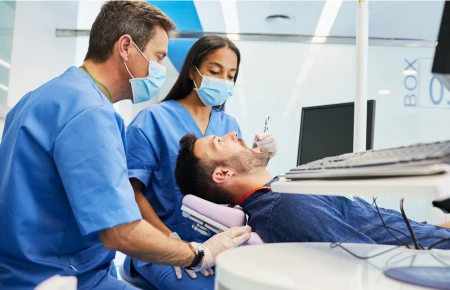Orthodontic Treatment

Things to Consider for Patients Receiving Orthodontic Treatment
It is important to wear your rubber bands as prescribed by your orthodontist. This will help move your teeth into proper alignment.
You will need to be extra careful when brushing and flossing your teeth while you are wearing braces. Be sure to use a soft-bristled toothbrush and to floss very gently so you don't damage your gums or braces.
You may experience some discomfort when you first get your braces. This is normal, and it will go away as your mouth adjusts to the new hardware. In the meantime, you can take over-the-counter pain relievers to help ease the discomfort.
Your orthodontist will need to see you for regular checkups to make sure your braces are working properly. Be sure to keep all of your appointments and follow your orthodontist's instructions.
If you have any problems with your braces or if you experience any pain, be sure to contact your orthodontist right away.
What are the factors that you require before any orthodontic treatment?
Many factors must be considered before beginning orthodontic treatment. The first is the severity of the patient's dental malocclusion or a bad bite. Treatment may not be necessary if the malocclusion is very mild. More severe cases will require more extensive treatment. The second factor is the age of the patient. Children and teens are still growing, and their bones are more malleable than those of adults. This means that treatment can be more effective for them. Adults, on the other hand, may require more time in treatment, as their bones are more set. The third factor is the health of the patient's teeth and gums. Orthodontic treatment can put a lot of stress on the teeth and gums, so they must be healthy before treatment begins. The fourth factor is the patient's bite. If the bite is not corrected, the teeth can become damaged. The fifth factor is the patient's lifestyle. Patients who play sports or who have other activities that put them at risk for injury may need to take special precautions. Finally, the cost of treatment must be considered. Orthodontic treatment can be expensive, and insurance may not cover all of the costs.
What are the 4 objectives of orthodontic treatment?
Orthodontic treatment usually has four objectives:
- To improve the appearance of the teeth and smile
- To improve the function of the teeth
- To prevent or correct tooth decay
- To improve the overall health of the mouth
What precautions should be taken during braces?
When you have braces, you need to take special care of your teeth and gums. Here are some things you need to do:
- Brush your teeth carefully and often. You need to brush after every meal, and you need to be careful not to damage your braces. Use a soft-bristled toothbrush and toothpaste that is gentle on your gums.
- Floss your teeth every day. This will help to remove food and plaque from between your teeth and under your gum line.
- Avoid hard and sticky foods. Chewy candy, nuts, and popcorn can damage your braces. Hard fruits and vegetables can also be difficult to eat with braces.
- Be careful with your teeth. Avoid biting your nails, chewing on ice, and grinding your teeth. All of these habits can damage your braces.
- See your dentist and orthodontist regularly. You will need to have your teeth cleaned and checked often to make sure that your braces are working properly.
Do and don'ts for braces?
If you're thinking about getting braces, congratulations! You're on your way to a straighter, more beautiful smile. But before you start, there are a few things you should know about how to take care of your braces. Here are some do's and don'ts to keep in mind:
DO:
- Brush your teeth regularly. This is important even if you don't have braces, but it's especially important when you do. Be sure to brush gently around the brackets and wires of your braces to avoid irritating your gums.
- Floss regularly. Just like brushing, flossing is important for both people with and without braces. Be sure to floss carefully around the brackets and wires to avoid damaging your braces.
- Eat healthy foods. Eating sugary, sticky, or hard foods can damage your braces, so it's important to be mindful of what you're eating. Stick to soft, healthy foods like fruits and vegetables to avoid damaging your braces.
- Wear a mouthguard. If you play sports, it's important to wear a mouthguard to protect your braces. Mouthguards can help prevent damage to your teeth, gums, and braces.
DON'T:
- Chew on hard objects. This can damage your braces and even break off a bracket. So, avoid chewing on hard candy, ice, or other hard objects.
- Eat sticky foods. Sticky foods can get stuck in your braces and be difficult to remove. They can also damage your braces. So, avoid eating sticky foods like gum, candy, or fruit roll-ups.
- Play with your braces. Playing with your braces can damage them and cause them to become loose. So, resist the urge to play with your braces and leave them alone.
- Forget to brush and floss. As we mentioned, it's important to brush and floss your teeth regularly, even if you have braces. forgetting to do so can lead to cavities, gum disease, and other dental problems.
Taking care of your braces is important to avoid damage and keep your smile looking great. So, be sure to follow these do's and don'ts to keep your braces in tip-top shape.
To learn more about orthodontic treatment and ask your questions, give us a call at 248-650-2440 or visit our dental clinic.
Please visit our Linkedin page for more information.






